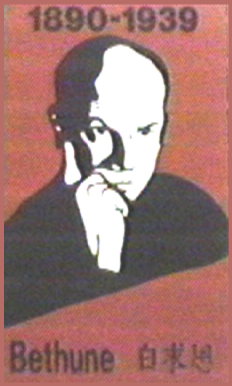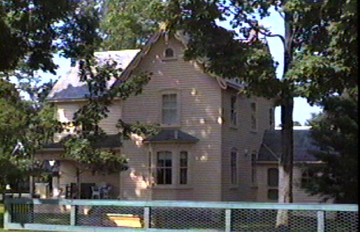People's Republic of China
Norman Bethune Commemorative

On March 3, 1990 China issued these stamps honouring the centenary of the birth of the Canadian surgeon
and revolutionary hero, Norman Bethune (1890-1939). On March 2 Canada Post released a
similar design.
IN MEMORY OF NORMAN BETHUNE
December 21, 1939
Comrade Norman Bethune, a member of the Communist Party of Canada, was around fifty when he was sent by the Communist Parties of Canada and the United States to China; he made light of travelling thousands of miles to help us in our War of Resistance Against Japan. He arrived in Yenan in the spring of last year, went to work in the Wutai Mountains, and to our great sorrow died a martyr at his post. What kind of spirit is this that makes a foreigner selflessly adopt the cause of the Chinese people's liberation as his own? It is the spirit of internationalism, the spirit of communism, from which every Chinese Communist must learn. Leninism teaches that the world revolution can only succeed if the proletariat of the capitalist countries supports the struggle for liberation of the colonial and semicolonial peoples and if the proletariat of the colonies and semi-colonies supports that of the proletariat of the capitalist countries. Comrade Bethune put this Leninist line into practice. We Chinese Communists must also follow this line in our practice. We must unite with the proletariat of all the capitalist countries, with the proletariat of Japan, Britain, the United States, Germany, Italy and all other capitalist countries, before it is possible to overthrow imperialism, to liberate our nation and people, and to liberate the other nations and peoples of the world. This is our internationalism, the internationalism with which we oppose both narrow nationalism and narrow patriotism.
Comrade Bethune's spirit, his utter devotion to others without any thought of self, was shown in his boundless sense of responsibility in his work and his boundless warmheartedness towards all comrades and the people. Every Communist must learn from him. There are not a few people who are irresponsible in their work, preferring the light to the heavy, shoving the heavy loads on to others and choosing the easy ones for themselves. At every turn they think of themselves before others. When they make some small contribution, they swell with pride and brag about it for fear that others will not know. They feel no warmth towards comrades and the people but are cold, indifferent and apathetic. In fact such people are not Communists, or at least cannot be counted as true Communists. No one who returned from the front failed to express admiration for Bethune whenever his name was mentioned, and none remained unmoved by his spirit. In the Shansi-Chahar-Hopei border area, no soldier or civilian was unmoved who had been treated by Dr. Bethune or had seen how he worked. Every Communist must learn this true communist spirit from Comrade Bethune.
Comrade Bethune was a doctor, the art of healing was his profession and he was constantly perfecting his skill, which stood very high in the Eighth Route Army's medical service. His example is an excellent lesson for those people who wish to change their work the moment they see something different and for those who despise technical work as of no consequence or as promising no future.
Comrade Bethune and I met only once. Afterwards he wrote me many letters. But I was busy, and I wrote him only one letter and do not even know if he ever received it. I am deeply grieved over his death. Now we are all commemorating him, which shows how profoundly his spirit inspires everyone. We must all learn the spirit of absolute selflessness from him. With this spirit everyone can be very useful to the people. A man's ability may be great or small, but if he has this spirit, he is already noble-mindcd and pure, a man of moral integrity and above vulgar interests, a man who is of value to the people.
Mao Tsetung. Five Articles by Chairman Mao Tsetung. Peking: Foreign Languages Press, 1972.

Commemorative Poster at Bethune's Gravenhurst Birthplace.

Bethune's Gravenhurst Birthplace is a National Historic Site.
The commemorative plaque outside of Bethune's birthplace pays the following tribute:
DR. NORMAN HENRY BETHUNE (1890-1939)
"An internationally famed humanitarian, surgeon and revolutionary, Bethune was born in this house. He graduated from the University of Toronto's Medical School during the First World War and saw extensive service in that conflict. While at Montreal's Royal Victoria Hospital 1929-1933 he gained widespread recognition as a thoracic surgeon. Increasing concern with social and political issues took him to Spain in 1936 where he organized Canadian medical aid for the Loyalist troops and set up the world's first mobile blood transfusion unit. Two years later he went to China and until his death worked tirelessly as a surgeon and medical advisor with the the 8th Route National Revolutionary Army. He is buried in the Mausoleum of Martyrs, Shichiachuang, China."
Bibliography
Allen, Ted and Sydney Gordon. The Scalpel, the Sword.Toronto: McClelland and Stewart, 1976.
"China." Standard Postage Stamp Catalogue. 1997.
Mao Tsetung. Five Articles by Chairman Mao Tsetung. Peking: Foreign Languages Press, 1972.
Stewart, Roderick. The Mind of Norman Bethune.Toronto: Fitzhenry and Whiteside, 1977.
© Grose Educational Media, 2004-2018